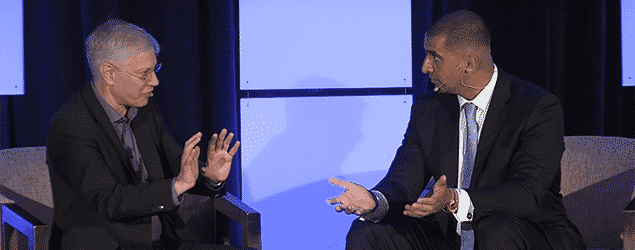Celebrate 60 Years of Atlas Shrugged with The Atlas Project
This October marks the 60th anniversary of the publication of Atlas Shrugged, Ayn Rand’s magnum opus. In celebration of this anniversary, ARI is sponsoring The Atlas Project, an online discussion group about the book. Participants can read a chapter a week, review and discuss questions we’ll post to the Project’s Facebook group, and watch weekly live sessions led by Greg Salmieri and me (Ben Bayer) every Tuesday night at 5:30 p.m. Pacific (8:30 p.m. eastern) via Facebook Live on the official Atlas Shrugged Facebook page. You can learn more about how the group will be run by watching the video of Greg and me up above.
The primary intended audience of the Project is first-time readers of Atlas. For this reason, a strict no-spoiler rule will be enforced both on the online discussion group and in our Facebook Live broadcasts. But we do encourage those who’ve already read the book to read it again with us, both to experience it again on an appropriate occasion, and also to revisit what it was like to read it for the first time (in light of the experience first-time readers share with us).
Whether you’re reading this for the first or the tenth time, it’s worth thinking about why an anniversary like this is worth celebrating, and in this particular form. As anniversaries go, a 60-year anniversary isn’t usually celebrated with as much fervor as, say, a 50- or 100- year anniversary. Of course, there is nothing all that special about the numbers involved. But as a major character in Atlas remarks, “celebrations should be only for those who have something to celebrate,” and there is a lot to celebrate about the impact this book has had even in just the past ten years.
Back in 2007, on the occasion of the traditional half-century mark, ARI sponsored a number of conferences and symposia. At the time, it was remarkable that a book published so long ago had continued to sell more than 100,000 copies a year and elicit steady media attention. But in 2007, we had no way of predicting just how much impact the novel would have in the decade to follow.
We couldn’t predict that the financial crisis, federal bailouts, and the election of Obama would occasion spikes in the sales of the book, because people thought the book had predicted the growing concentration of government power and its consequences. We couldn’t predict that Rick Santelli would get on CNBC and call in Ayn Rand’s name for a new tea party, or that Ted Cruz would read from Atlas in the well of the Senate, or that Rand would become a regular punching bag in Paul Krugman’s column in The New York Times. We couldn’t predict that critics, TV comics, and even President Obama himself, would take this bait and begin to lament and satirize Rand’s influence with drumbeat efficiency.
Ayn Rand’s ideas are now part of the cultural mainstream in a way they weren’t even just ten years ago, and this is in large part because of the enduring legacy of Atlas Shrugged. Prominent thinkers used to ignore Ayn Rand. Now they can’t avoid commenting on her, however much they might disagree with her.
But it’s also worth remembering that the escalating pace of Ayn Rand’s impact is doubtless attributable in part to the dramatic technological transformation of just the last decade. In 2007, e-commerce sales of print books had just captured 20 percent of market share, and Amazon had just introduced the Kindle. By 2013 e-commerce had captured over 50% of the market. In 2007, social media was only in its infancy: Facebook users numbered under 100 million worldwide. Now there are over 2 billion. In 2007, we had YouTube for those of us who had videos to upload from our desktops, but now we can broadcast video live from our nearly 2.5 billion smart phones. Of special interest: in 2007, you could spend hundreds of dollars to order CDs and tapes to listen to recorded lectures about Ayn Rand’s philosophy. Now they can be downloaded for free or for pennies on the dollar of their former price. We could not have predicted how easy it would become to access Rand’s books and ideas.
This is significant for reasons much more extensive than the value of learning about one set of ideas. This rapid progress in information technology in just the last decade has benefitted all of our lives considerably. This and other technological developments (in the fields of energy, automation, and genetics) have brought newfound opportunities to millions of people around the world. These millions have benefitted from the innovation and entrepreneurship of a comparatively small handful of individual thinkers. They saw a good world in 2007 and decided it wasn’t good enough.
Atlas Shrugged has something to say to the millions who’ve prospered from the efforts of this small band of thinkers, and it especially has something to say to those thinkers. Unlike any story ever told, it dramatizes their role in the world and delivers an estimate of the credit they are due for it — as well as an estimate of how well the world has done in giving that credit. So it is fitting that we should come to celebrate the anniversary of Atlas in a way that makes full use of the technological bounty that these innovators have helped provide. It is an opportunity to use that technology as a mirror to hold up to its creators, creators who too often do not fully recognize the prodigious significance of their efforts.



